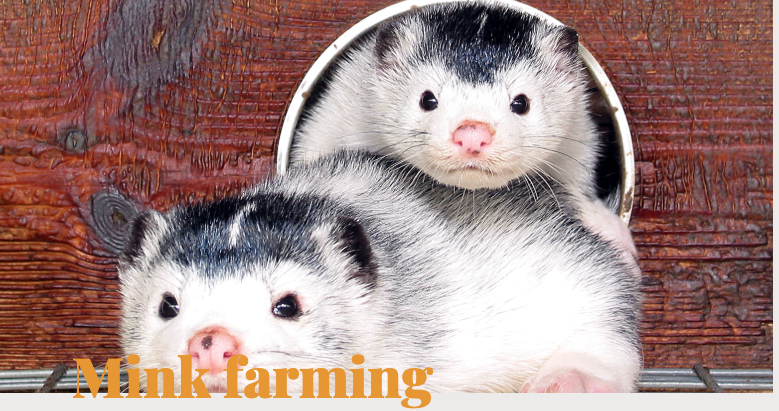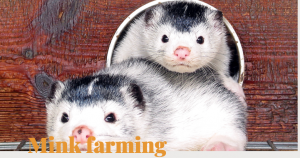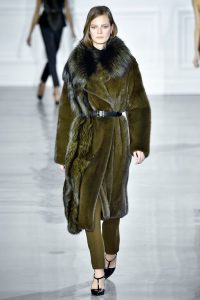
Nordstrom Announces Ban on Fur and Exotic Animal Skin Sales
California first state to pass a statewide fur ban last year
By Katy Grimes, October 1, 2020 1:45 pm

With the announcement by high-end retailer Nordstrom that it will stop selling fur and some “exotic” leather products, the Natural Fibers Alliance immediately condemned Nordstrom’s decision.
“Nordstrom’s baffling decision is akin to a steakhouse taking meat off the menu because one vegetarian complained,” said Mike Brown, executive director of the Natural Fibers Alliance. “You’d think a company whose stock has tanked 71% this year would want to sell more, not less. Businesses hurt themselves, consumers, and the environment when they limit customer choice and kowtow to extreme animal activists.”
Macy’s and Bloomingdale’s announced last year they will no longer sell fur. But Nordstrom goes a step further by banning products made from the skins of alligators, crocodiles, pythons, kangaroos and ostrich, Fox News reported.
Nordstrom announced in May they would permanently close 16 of the company’s 116 full-line stores because of the impact of COVID-19, USA Today reported. In addition, they permanently closed three Jeffrey designer apparel stores, one of which was in Palo Alto, CA. Six of the 16 now-closed Nordstrom stores are in California, which has 30 total Nordstrom stores, the most in the entire country.
California Globe covered the effort to ban fur products statewide in 2019. Assemblywoman Laura Friedman (D-Glendale) authored AB 44, which prohibits the sale and manufacture of new fur in California. Gov. Gavin Newsom signed AB 44 into law.
Friedman called fur a “fashion statement and statement of wealth. There is no need for warmth,” from fur, she said, mentioning the many faux fur products available.
“From her home in Glendale, California, Friedman wants California to lead the nation in statewide fur bans,” The Globe reported. “Today there are a variety of humane alternatives, both in terms of faux fur that is virtually indistinguishable from real fur, and alternative textiles that are just as warm or fashionable,” Friedman says. “There is no need for fur in the 21st century and no place for it in a sustainable future.”

California Globe noted that the fur trade ranks as one of America’s oldest, continuously operating industries, with more than 400 years of history. The fur industry in the United States comprises more than 1,000 fur retailers, 100 manufacturers, more than 200 small family farmers, and tens of thousands of trappers, all of whose businesses, jobs and livelihoods depend on the industry. Retail fur sales in California alone exceed $300 million, and is an important source of employment and tax revenues to the State.
Furriers located in California said their businesses cannot survive the state’s fur ban.
The Natural Fibers Alliance is a coalition of producers and associations, representing the interests of wool, leather, fur, and other natural materials, which supports the use of natural sustainable materials in clothing, accessories, and other goods.
“The ability of consumers to choose these materials is under attack from animal liberation activists, such as PETA, who want to ban consumers from having the choice to buy these products because they are derived from animals,” the Alliance said. “Nordstrom admits that its move to ban these products was made in conjunction with the Humane Society of the United States, a vegan advocacy group with a PETA-like agenda.”
“Synthetic materials are generally made from plastics, and synthetic garments are considered a major source of microplastic pollution that fouls our environment because they leach plastic fibers when they are washed and worn.”
“Further, animal activists also oppose silk and leather made from cowhide–a major part of Nordstrom’s offerings. By caving to the activists once, Nordstrom is merely inviting more demands and bullying on itself.”
Notably, California now has the distinction of not only being the first state in the country to ban the sale and manufacture of new fur products, Gov. Gavin Newsom also signed a law to allow drivers who fatally strike a deer, elk, antelope or wild pig to take the animal home and cook it.
California lawmakers and governors have a long history of animal “protections,” discounting the impact of culture and cost:
- fois gras ban, effective in 2012;
- ban on the ancient Asian delicacy shark fin soup;
- California lawmakers, and then voters, through the enactment of Proposition 2 and AB 1437, also known as the Farm Animal Cruelty Act, banned the sale of eggs from hens housed in small cages, allowing them to roam free… putting them at risk of predators and raptors. Many said this ban violates the commerce clause.
- Could President Trump End the Income Tax? - February 26, 2026
- Trump State of the Union: Democrats Showed They’re Not On the Side of The American People - February 25, 2026
- Leaving California: Public Storage Relocates HQ from California to Texas - February 25, 2026




It’s one thing when a left-wing wacko like Laura Friedman can’t stop herself from telling other people how to live their lives and eternally minding other people’s business, but quite another when a now-struggling company like Nordstrom wants to participate in its own destruction by caving in to a tiny voice whining weakly in a corner somewhere. Guess they have a death wish. Hmmm…. a mental health issue! I have an idea: Maybe the CEOs of Nordstrom, Macy’s, and Bloomingdale’s should come to CA and get free therapy from unqualified therapists who have “lived experience.” Looking at their odd business decisions it wouldn’t surprise me if they thought that was a great idea.
While I agree that the ban on fur and leather products is more silly PC virtue signalling, I still have to disagree with a couple of points here.
The process of producing fois gras is brutal and results in a sick animal. The practices connected to shark fin soup has put several species of marine life on the Endangered Species list and has ruined fisheries.
Last but not least, and certainly worst, as conservative as I am I still supported the Farm Animal Cruelty Act. No, I’m not overly concerned about the welfare of pea-brained commercial chickens. Rather, I’ve seen what goes on in these stack ‘n’ pack CAFO’s. It’s an understatement to say these places are a community health hazard. The birds, packed in like sardines, become psychotic and unhealthy. Cannibalism is common. Dead birds are often left where they died to rot or mummify in the cages with live birds. Excrement, feathers, blood, and broken eggs end up in a slurry on the floors, left to rot there and attract rats and other vermin. It would be safer to eat your dinner directly off of the floor of a public restroom than to eat anything that came out of such facilities.
I really can’t see a law that stops this sort of thing as a mistake. One thing we too often fail to do is to consider the impacts to our health and quality of life when determining costs and benefits.
What next will Democrat dictators ban? Maybe a ban on selling leather shoes, belts, and handbags?
It is sad that animal activists have so confused the issue that some people believe that banning natural fur products and promoting petroleum-based synthetics is a way to help nature. We now know that fake furs and other petroleum-based synthetics leach thousands of micro-particles of plastic into our waterways (and into marine life) every time they are washed. Fur is a sustainably-produced, long-lasting, recyclable, biodegradable natural material. For more about the environmental ethic of the modern fur trade check out TruthAboutFur.